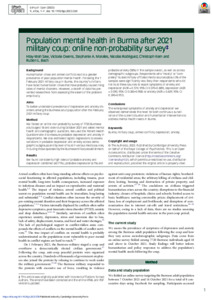|
Population mental health in Burma after 2021 military coup: online non-probability survey
Saw, Htay-Wah
;
Owens, Victoria
;
Morales, Stephanie A.
;
Rodriguez, Nicolas
;
Kern, Christoph
;
Bach, Ruben L.
![[img]](https://madoc.bib.uni-mannheim.de/65732/1.hassmallThumbnailVersion/population-mental-health-in-burma-after-2021-military-coup-online-non-probability-survey.pdf)  Vorschau |
|
PDF
population-mental-health-in-burma-after-2021-military-coup-online-non-probability-survey.pdf
- Veröffentlichte Version
Download (326kB)
|
|
DOI:
|
https://doi.org/10.1192/bjo.2023.550
|
|
URL:
|
https://www.cambridge.org/core/journals/bjpsych-op...
|
|
Weitere URL:
|
https://www.researchgate.net/publication/373113113...
|
|
URN:
|
urn:nbn:de:bsz:180-madoc-657328
|
|
Dokumenttyp:
|
Zeitschriftenartikel
|
|
Erscheinungsjahr:
|
2023
|
|
Titel einer Zeitschrift oder einer Reihe:
|
BJPsych Open
|
|
Band/Volume:
|
9
|
|
Heft/Issue:
|
5
|
|
Seitenbereich:
|
1-7
|
|
Ort der Veröffentlichung:
|
Cambridge
|
|
Verlag:
|
Cambridge University Press
|
|
ISSN:
|
2056-4724
|
|
Verwandte URLs:
|
|
|
Sprache der Veröffentlichung:
|
Englisch
|
|
Einrichtung:
|
Außerfakultäre Einrichtungen > MZES - Arbeitsbereich A
|
|
Bereits vorhandene Lizenz:
|
 Creative Commons Namensnennung 4.0 International (CC BY 4.0) Creative Commons Namensnennung 4.0 International (CC BY 4.0)
|
|
Fachgebiet:
|
300 Sozialwissenschaften, Soziologie, Anthropologie
|
|
Abstract:
|
Background
Humanitarian crises and armed conflicts lead to a greater prevalence of poor population mental health. Following the 1 February 2021 military coup in Burma, the country's civilians have faced humanitarian crises that have probably caused rising rates of mental disorders. However, a dearth of data has prevented researchers from assessing the extent of the problem empirically.
Aims
To better understand prevalence of depressive and anxiety disorders among the Burmese adult population after the February 2021 military coup.
Method
We fielded an online non-probability survey of 7720 Burmese adults aged 18 and older during October 2021 and asked mental health and demographic questions. We used the Patient Health Questionnaire-4 to measure probable depression and anxiety in respondents. We also estimated logistic regressions to assess variations in probable depression and anxiety across demographic subgroups and by level of trust in various media sources, including those operated by the Burmese military establishment.
Results
We found consistently high rates of probable anxiety and depression combined (60.71%), probable depression (61%) and probable anxiety (58%) in the sample overall, as well as across demographic subgroups. Respondents who ‘mostly’ or ‘completely’ trusted military-affiliated media sources (about 3% of the sample) were significantly less likely than respondents who did not trust these sources to report symptoms of anxiety and depression (AOR = 0.574; 95% CI 0.370–0.889), depression (AOR = 0.590; 95% CI 0.383–0.908) or anxiety (AOR = 0.609; 95% CI 0.390–0.951).
Conclusions
The widespread symptoms of anxiety and depression we observed demonstrate the need for both continuous surveillance of the current situation and humanitarian interventions to address mental health needs in Burma.
|
 | Dieser Eintrag ist Teil der Universitätsbibliographie. |
 | Das Dokument wird vom Publikationsserver der Universitätsbibliothek Mannheim bereitgestellt. |
 Suche Autoren in Suche Autoren in
BASE:
Saw, Htay-Wah
;
Owens, Victoria
;
Morales, Stephanie A.
;
Rodriguez, Nicolas
;
Kern, Christoph
;
Bach, Ruben L.
Google Scholar:
Saw, Htay-Wah
;
Owens, Victoria
;
Morales, Stephanie A.
;
Rodriguez, Nicolas
;
Kern, Christoph
;
Bach, Ruben L.
ORCID:
Saw, Htay-Wah ; Owens, Victoria ; Morales, Stephanie A. ; Rodriguez, Nicolas ; Kern, Christoph  ORCID: 0000-0001-7363-4299 ORCID: 0000-0001-7363-4299 ; Bach, Ruben L.  ORCID: 0000-0001-5690-2829 ORCID: 0000-0001-5690-2829
Sie haben einen Fehler gefunden? Teilen Sie uns Ihren Korrekturwunsch bitte hier mit: E-Mail
Actions (login required)
 |
Eintrag anzeigen |
|
|
 ORCID: 0000-0001-7363-4299 ; Bach, Ruben L.
ORCID: 0000-0001-7363-4299 ; Bach, Ruben L.  ORCID: 0000-0001-5690-2829
ORCID: 0000-0001-5690-2829



 Creative Commons Namensnennung 4.0 International (CC BY 4.0)
Creative Commons Namensnennung 4.0 International (CC BY 4.0) Suche Autoren in
Suche Autoren in